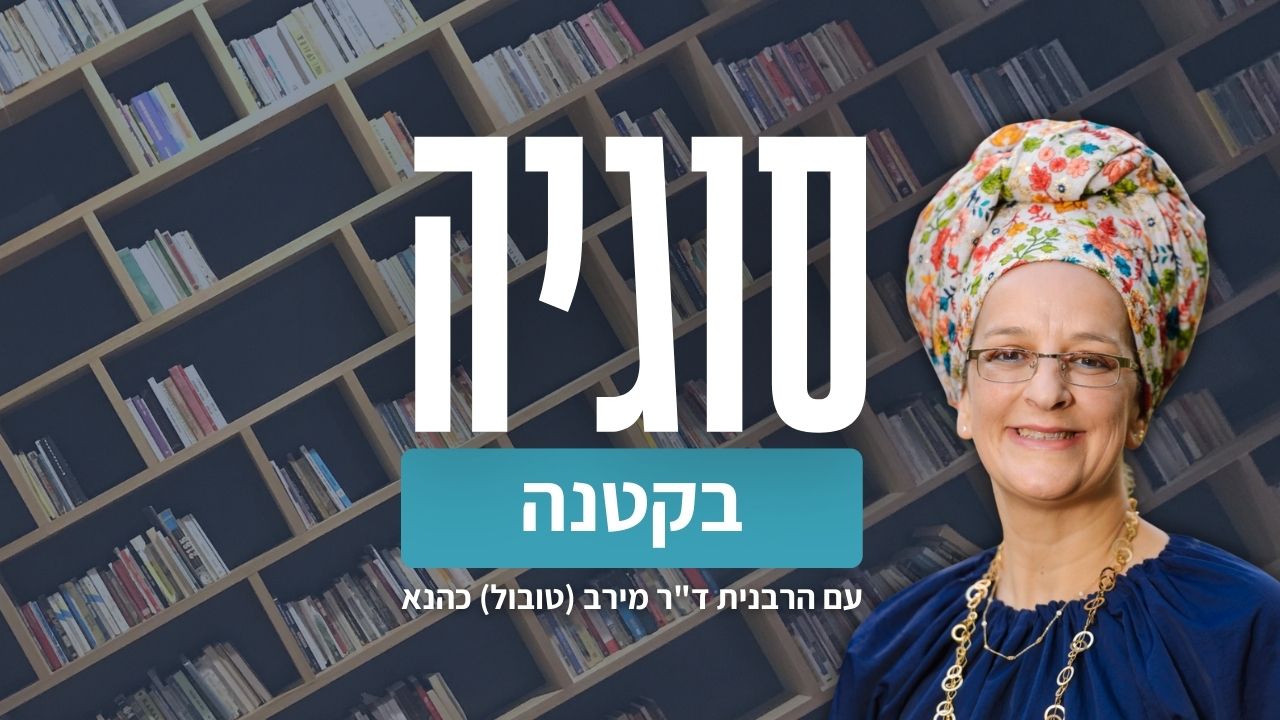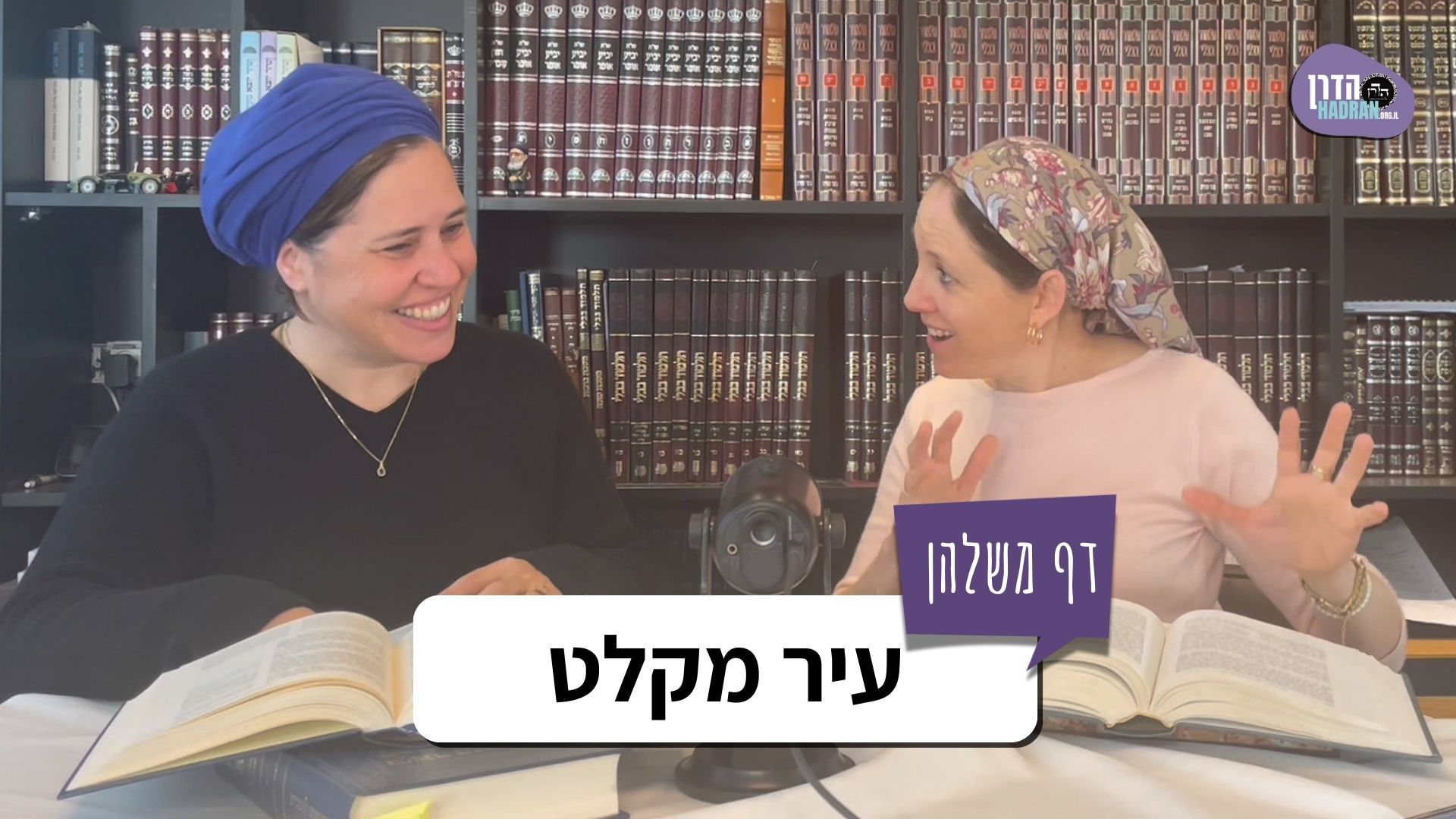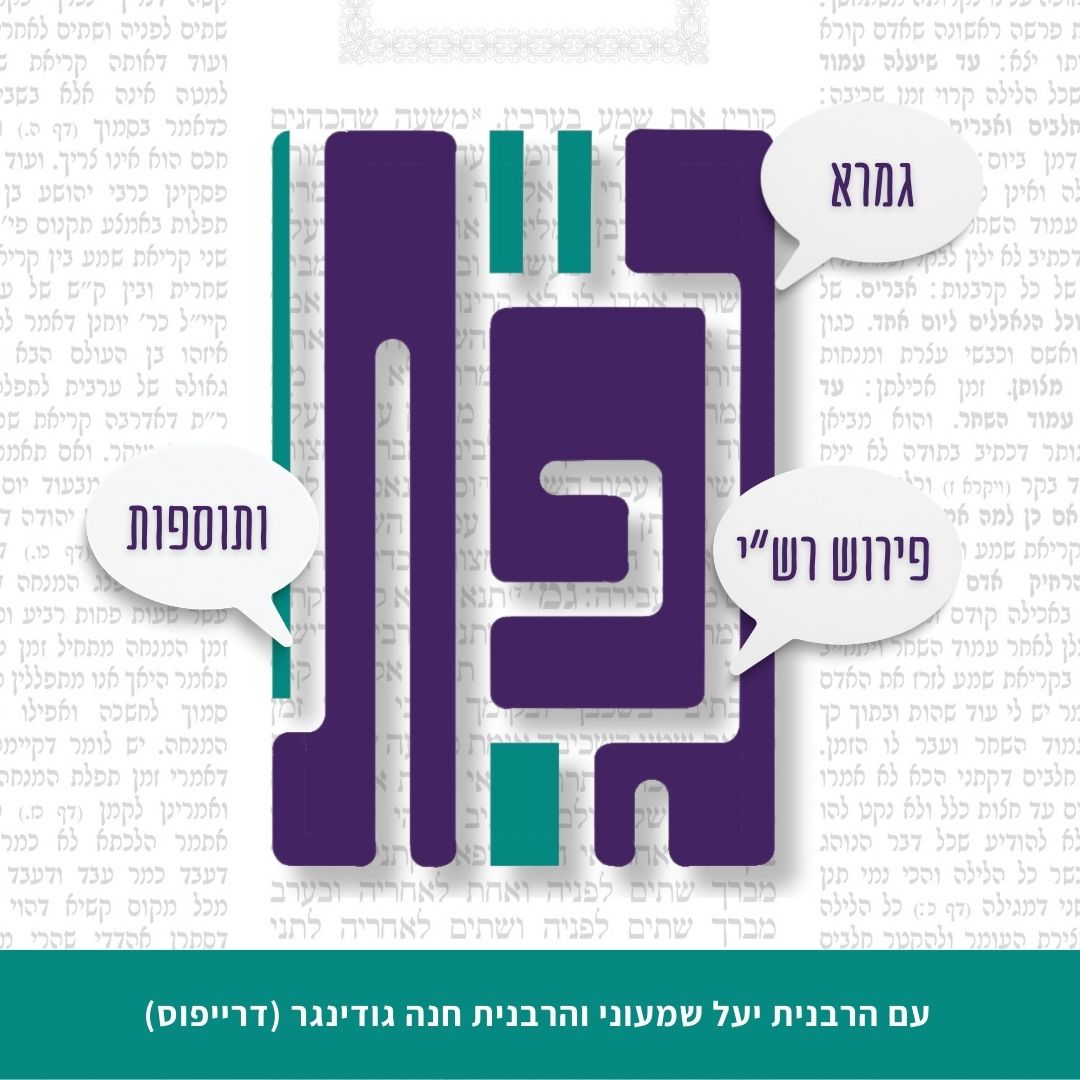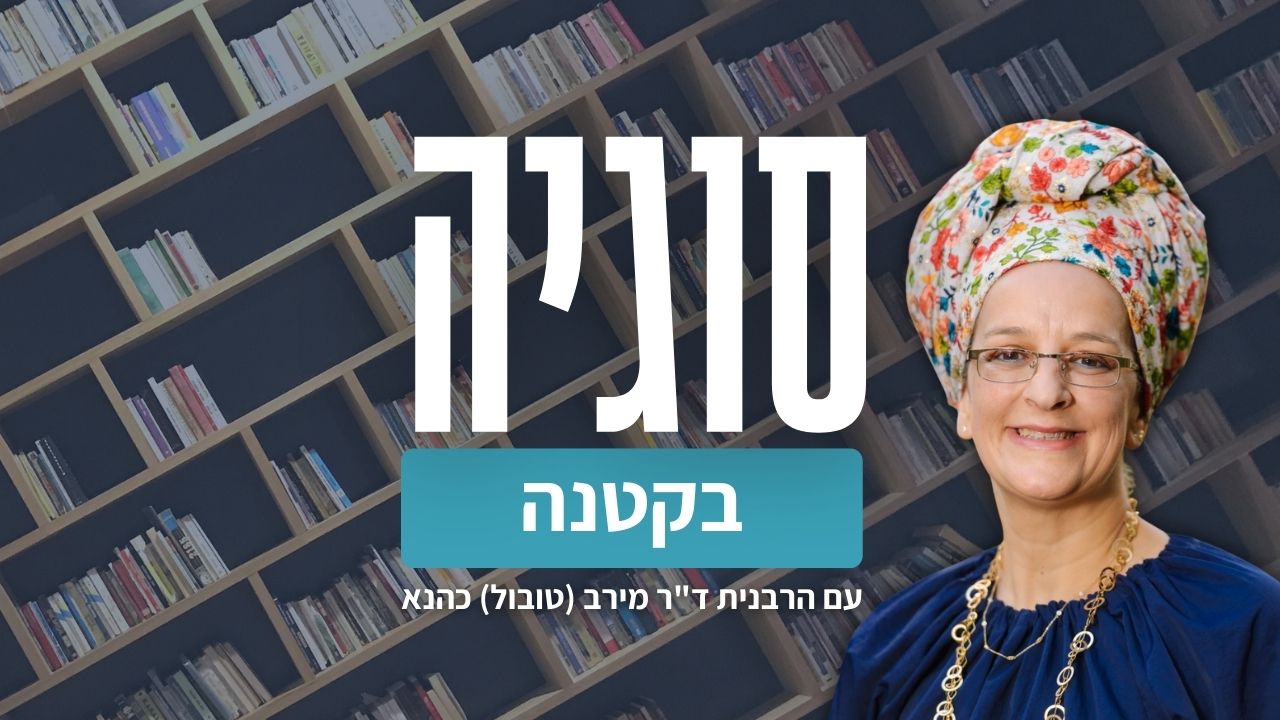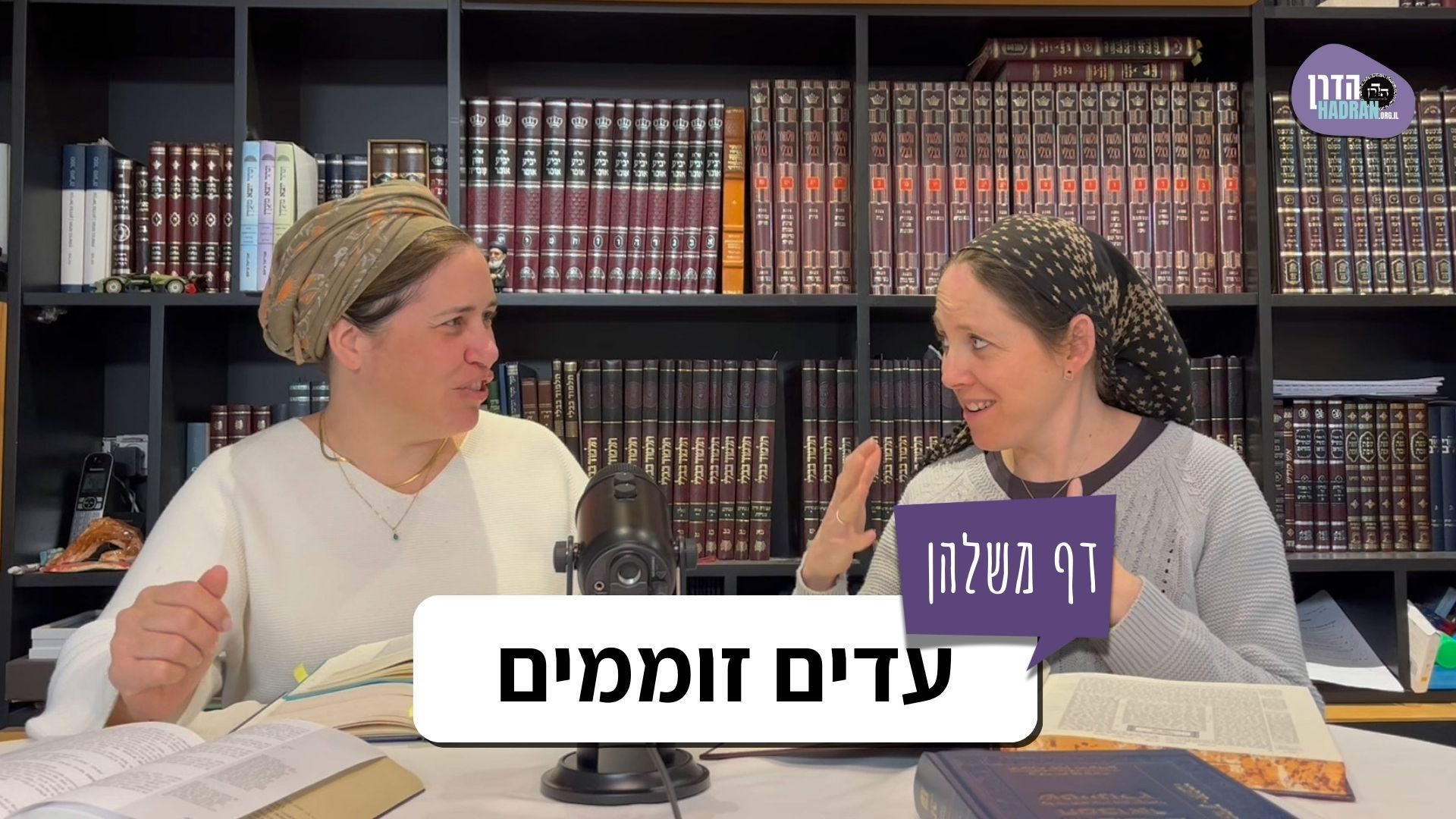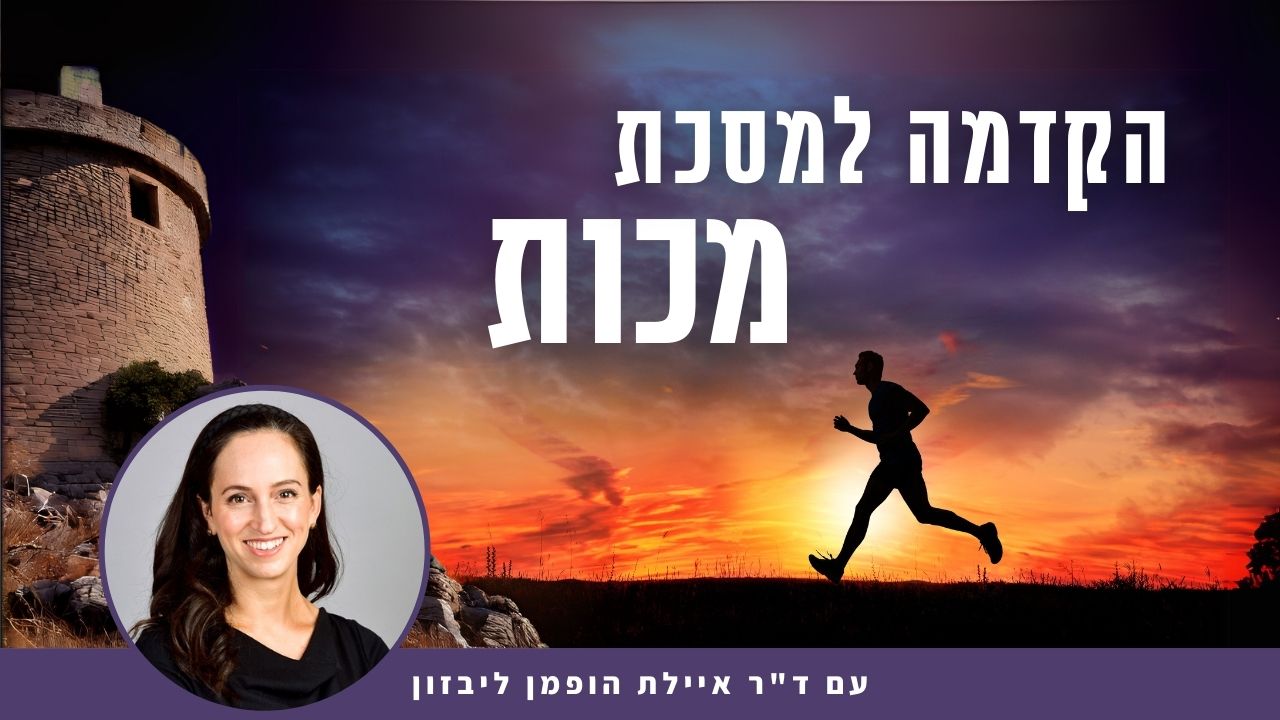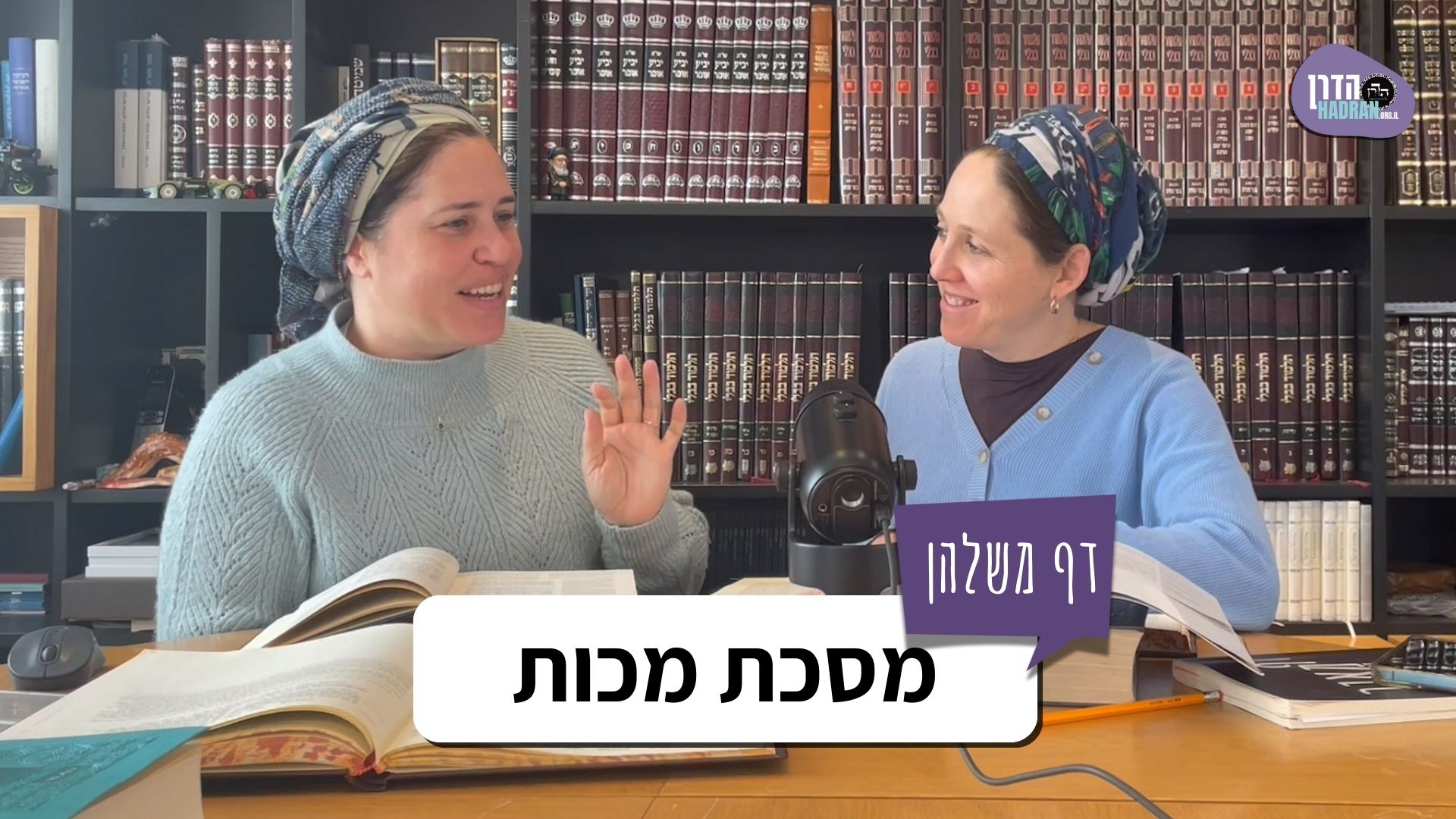מכות יא
בְּלָשׁוֹן עַזָּה, דִּכְתִיב: ״וַיְדַבֵּר ה׳ אֶל יְהוֹשֻׁעַ לֵאמֹר דַּבֵּר אֶל בְּנֵי יִשְׂרָאֵל לֵאמֹר תְּנוּ לָכֶם אֶת עָרֵי הַמִּקְלָט אֲשֶׁר דִּבַּרְתִּי אֲלֵיכֶם וְגוֹ׳״? מִפְּנֵי שֶׁהֵן שֶׁל הַתּוֹרָה.
with harsh language, as it is written: “And the Lord spoke [vayedabber] to Joshua saying: Speak [dabber] to the children of Israel, saying: Assign you the cities of refuge of which I spoke [dibbarti] to you by means of Moses” (Joshua 20:1–2). Why does the Torah repeatedly employ a term of dibbur, connoting harsh speech, as opposed to the term of amira, connoting neutral speech? It is due to the fact that the cities of refuge are a mitzva of the Torah, and therefore they warrant emphasis.
לְמֵימְרָא דְּכׇל דִּיבּוּר לָשׁוֹן קָשָׁה? אִין, כְּדִכְתִיב: ״דִּבֶּר הָאִישׁ אֲדֹנֵי הָאָרֶץ אִתָּנוּ קָשׁוֹת״. וְהָתַנְיָא: ״נִדְבְּרוּ״, אֵין ״נִדְבְּרוּ״ אֶלָּא לְשׁוֹן נַחַת, וְכֵן הוּא אוֹמֵר ״יַדְבֵּר עַמִּים תַּחְתֵּינוּ״! ״דִּבֶּר״ לְחוּד, ״יַדְבֵּר״ לְחוּד.
The Gemara asks: Is that to say that all instances of speaking [dibbur] indicate harsh language? The Gemara answers: Yes, as it is written with regard to Joseph’s brothers: “The man, the lord of the land, spoke [dibber] harshly to us” (Genesis 42:30). The Gemara asks: But isn’t it taught in a baraita with regard to the verse: “Then they who feared the Lord spoke [nidberu] with one another” (Malachi 3:16), that the term “they spoke” is nothing other than a term of gentleness, and likewise, the same is true of the verse which states: “He subdues [yadber] peoples under us” (Psalms 47:4), meaning that God will calmly and gently conduct the nations under the influence of the Jewish people? The Gemara answers: The meaning of dibber is discrete and the meaning of yadber is discrete. There is a difference between the two conjugations of the same root.
(סִימָנֵי רַבָּנַן מְהֵמְנֵי וְסָפְרֵי).
The Gemara provides a mnemonic for the disputes involving Rabbi Yehuda that follow: Rabbis; mehemni, i.e., the dispute with Rabbi Neḥemya; and the dispute with regard to Torah scrolls sewn with threads of flax.
פְּלִיגִי בַּהּ רַבִּי יְהוּדָה וְרַבָּנַן, חַד אוֹמֵר: מִפְּנֵי שֶׁשִּׁיהָם. וְחַד אוֹמֵר: מִפְּנֵי שֶׁהֵן שֶׁל תּוֹרָה.
The Gemara resumes the discussion of the harsh language employed in the portion discussing murderers in the book of Joshua. Rabbi Yehuda and the Rabbis disagree with regard to this matter. One says harsh language was employed because Joshua delayed fulfilling the mitzva of designating cities of refuge, and one says it is because the cities of refuge are a mitzva of the Torah, and therefore they warrant emphasis.
״וַיִּכְתֹּב יְהוֹשֻׁעַ אֶת הַדְּבָרִים הָאֵלֶּה בְּסֵפֶר תּוֹרַת אֱלֹהִים״, פְּלִיגִי בַּהּ רַבִּי יְהוּדָה וְרַבִּי נְחֶמְיָה – חַד אוֹמֵר: שְׁמֹנָה פְּסוּקִים, וְחַד אוֹמֵר: עָרֵי מִקְלָט.
The Gemara cites an additional dispute with regard to the portion of the cities of refuge in the book of Joshua. It is written: “And Joshua wrote these matters in the scroll of the Torah of God” (Joshua 24:26). Rabbi Yehuda and Rabbi Neḥemya disagree with regard to this matter. One says: The reference is to the final eight verses in the Torah that record the death of Moses and were recorded by Joshua in the scroll of the Torah, in addition to the rest of the Torah that was written by Moses (see Bava Batra 15a). And one says: The reference is to the portion of the cities of refuge that appears in the book of Joshua.
בִּשְׁלָמָא לְמַאן דְּאָמַר שְׁמֹנָה פְּסוּקִים, הַיְינוּ דִּכְתִיב: ״בְּסֵפֶר תּוֹרַת אֱלֹהִים״. אֶלָּא לְמַאן דְּאָמַר עָרֵי מִקְלָט, מַאי ״בְּסֵפֶר תּוֹרַת אֱלֹהִים״? הָכִי קָאָמַר: ״וַיִּכְתּוֹב יְהוֹשֻׁעַ בְּסִפְרוֹ אֶת הַדְּבָרִים הָאֵלֶּה הַכְּתוּבִים בְּסֵפֶר תּוֹרַת אֱלֹהִים״.
The Gemara discusses these two opinions: Granted, according to the one who says that the reference is to the final eight verses in the Torah, that is the reason that it is written: “And Joshua wrote these matters in the scroll of the Torah of God,” as he wrote those verses and they were included in the Torah. But according to the one who says that the reference is to the portion of the cities of refuge in the book of Joshua, what is the meaning of the phrase “in the scroll of the Torah of God”? They appear in the book of Joshua, not in the Torah. The Gemara answers: This is what the verse is saying: And Joshua wrote in his book these matters that are also written in the scroll of the Torah of God.
סֵפֶר שֶׁתְּפָרוֹ בְּפִשְׁתָּן, פְּלִיגִי בַּהּ רַבִּי יְהוּדָה וְרַבִּי מֵאִיר – חַד אוֹמֵר: כָּשֵׁר, וְחַד אוֹמֵר: פָּסוּל.
The Gemara proceeds to cite another dispute between Rabbi Yehuda and one of the Sages in which it is not clear which opinion is attributable to which Sage. In the case of a Torah scroll where one sewed its sheets with linen threads, Rabbi Yehuda and Rabbi Meir disagree with regard to this matter. One says: The Torah scroll is fit for use, and one says: The Torah scroll is unfit for use.
לְמַאן דְּאָמַר פָּסוּל, דִּכְתִיב: ״לְמַעַן תִּהְיֶה תּוֹרַת ה׳ בְּפִיךָ״, וְאִיתַּקַּשׁ כׇּל הַתּוֹרָה כּוּלָּהּ לִתְפִילִּין: מָה תְּפִילִּין הֲלָכָה לְמֹשֶׁה מִסִּינַי לְתוֹפְרָן בְּגִידִין – אַף כֹּל לְתׇפְרָן בְּגִידִין. וְאִידַּךְ: כִּי אִיתַּקַּשׁ – לַמּוּתָּר בְּפִיךְ, לְהִלְכוֹתָיו לָא אִיתַּקַּשׁ.
The Gemara elaborates: According to the one who says that the Torah scroll is unfit for use, the reason is as it is written with regard to phylacteries: “And it shall be for you a sign on your hand and a memorial between your eyes, in order that the Torah of God shall be in your mouth” (Exodus 13:9). And in this verse the entire Torah is juxtaposed and likened to phylacteries: Just as with regard to phylacteries, there is a halakha transmitted to Moses from Sinai to sew them with sinews, so too, with regard to all sheets of the Torah scroll, there is a requirement to sew them with sinews. And the other Sage holds: When the Torah scroll is juxtaposed and likened to phylacteries, it is only with regard to the principle that the sheets of the Torah scroll may be prepared only from a species of animal that is permitted to your mouth, i.e., that it is permitted for a Jew to eat; but with regard to its other halakhot, it is not juxtaposed and likened to phylacteries.
אָמַר רַב: חֲזֵינַן לְהוּ לִתְפִילִּין דְּבֵי חֲבִיבִי דִּתְפִירִי בְּכִיתָּנָא, וְלֵית הִלְכְתָא כְּווֹתֵיהּ.
Rav said: I saw that the phylacteries of the house of my uncle, Rabbi Ḥiyya, were sewn with linen. But the halakha is not in accordance with his opinion; phylacteries may be sewn only with sinews.
מַתְנִי׳ אֶחָד מָשׁוּחַ בְּשֶׁמֶן הַמִּשְׁחָה, וְאֶחָד הַמְרוּבֶּה בִּבְגָדִים, וְאֶחָד שֶׁעָבַר מִמְּשִׁיחוּתוֹ – מַחֲזִירִין אֶת הָרוֹצֵחַ. רַבִּי יְהוּדָה אוֹמֵר: אַף מְשׁוּחַ מִלְחָמָה מַחֲזִיר אֶת הָרוֹצֵחַ.
MISHNA: The Torah states that an unintentional murderer is required to remain in the city of refuge to which he fled until the death of the High Priest. The mishna elaborates: With regard to High Priests, who were appointed in several different manners, one anointed with the anointing oil, which was the method through which High Priests were consecrated until the oil was sequestered toward the end of the First Temple period; and one consecrated by donning multiple garments, the eight vestments unique to the High Priest, which was the practice during the Second Temple period; and one who received a temporary appointment due to the unfitness of the serving High Priest, who departed from his anointment with the restoration of the serving High Priest to active service, their deaths facilitate the return of the murderer from the city of refuge to his home. Rabbi Yehuda says: Even the death of a priest anointed for war to address the soldiers (see Deuteronomy 20:1–7) facilitates the return of the murderer.
לְפִיכָךְ אִימּוֹתֵיהֶן שֶׁל כֹּהֲנִים מְסַפְּקוֹת לָהֶן מִחְיָה וּכְסוּת, כְּדֵי שֶׁלֹּא יִתְפַּלְּלוּ עַל בְּנֵיהֶם שֶׁיָּמוּתוּ.
The mishna continues: Therefore, the mothers of High Priests would provide those exiled to cities of refuge with sustenance and garments so that they would not pray that their sons would die. The more comfortable their lives in the city of refuge, the less urgency they would feel to leave, and the less likely it would be that they would pray for the death of the High Priests.
גְּמָ׳ מְנָא הָנֵי מִילֵּי? אָמַר רַב כָּהֲנָא: דְּאָמַר קְרָא: ״וְיָשַׁב בָּהּ עַד מוֹת הַכֹּהֵן הַגָּדֹל״, וּכְתִיב: ״כִּי בְעִיר מִקְלָטוֹ יֵשֵׁב עַד מוֹת הַכֹּהֵן הַגָּדֹל״, וּכְתִיב: ״וְאַחֲרֵי מוֹת הַכֹּהֵן הַגָּדֹל״.
GEMARA: The Gemara asks: From where are these matters, that the death of these High Priests facilitates the return of the murderer, derived? Rav Kahana said they are derived from a verse, as the verse states: “And he shall dwell there until the death of the High Priest who was anointed with the sacred oil” (Numbers 35:25), and it is written: “For in his city of refuge he shall dwell until the death of the High Priest” (Numbers 35:28), and it is written: “And after the death of the High Priest the murderer shall return to his ancestral land” (Numbers 35:28). The three mentions of the death of the High Priest correspond to the three types of High Priest enumerated by the first tanna of the mishna: One anointed with oil, one consecrated by donning the eight vestments, and one who was relieved of his position.
וְרַבִּי יְהוּדָה? כְּתִיב קְרָא אַחֲרִינָא: ״לָשׁוּב לָשֶׁבֶת בָּאָרֶץ עַד מוֹת הַכֹּהֵן״. (וְגוֹ׳) וְאִידַּךְ: מִדְּלָא כְּתִיב: ״הַגָּדוֹל״ – חַד מֵהָנָךְ הוּא.
And Rabbi Yehuda holds that another verse is written: “And you shall take no ransom for him that fled to his city of refuge, to return and dwell in the land until the death of the priest” (Numbers 35:32), from which it is derived that the death of the priest anointed for war also facilitates the return of the murderer. And the other tanna says: From the fact that High Priest is not written in that verse, it is clear that the reference is not to an additional type of High Priest; rather, the reference is to one of those High Priests mentioned in the preceding verses.
לְפִיכָךְ אִימּוֹתֵיהֶן שֶׁל כֹּהֲנִים כּוּ׳. טַעְמָא דְּלָא מְצַלּוּ, הָא מְצַלּוּ – מָיְיתִי? וְהָכְתִיב: ״כַּצִּפּוֹר לָנוּד כַּדְּרוֹר לָעוּף כֵּן קִלְלַת חִנָּם לֹא תָבֹא״! אֲמַר לֵיהּ הָהוּא סָבָא: מִפִּירְקֵיהּ דְּרָבָא שְׁמִיעַ לִי, שֶׁהָיָה לָהֶן לְבַקֵּשׁ רַחֲמִים עַל דּוֹרָן וְלֹא בִּקְּשׁוּ.
§ The mishna teaches: Therefore, the mothers of High Priests would provide those exiled to cities of refuge with sustenance and garments so that they would not pray that their sons will die. The Gemara asks: The reason that the High Priest will not die is that they do not pray; but if they prayed for the death of the High Priest, would he die? But isn’t it written: “As the wandering sparrow, as the flying swallow, so a curse that is baseless shall come home” (Proverbs 26:2)? Why does the mishna express concern over a baseless curse? A certain elder said to him: I heard in the lecture delivered by Rava that it is not a baseless curse, as the High Priests share the blame for the unintentional murders performed by these people, as they should have pleaded for mercy for their generation, that no murder should transpire, even unintentionally, and they did not plead. Due to their share in the blame, prayers for their death could be effective.
וְאִיכָּא דְּמַתְנֵי: כְּדֵי שֶׁיִּתְפַּלְּלוּ עַל בְּנֵיהֶם שֶׁלֹּא יָמוּתוּ. טַעְמָא דִּמְצַלּוּ, הָא לָא מְצַלּוּ – מָיְיתִי? מַאי הֲוָה לֵיהּ לְמֶעְבַּד? הָכָא אָמְרִינַן: טוֹבִיָּה חֲטָא וְזִיגּוּד מִנַּגַּיד.
And some teach a variant reading of the mishna: Therefore, the mothers of High Priests would provide those exiled to cities of refuge with sustenance and garments, so that those exiled would pray that their sons will not die. The Gemara infers: The reason that the High Priests will not die is that they pray, but if they did not pray for the High Priest not to die, would the High Priest die? What could the High Priest have done to prevent the unintentional murder? Here, in Babylonia, we say an adage to describe a situation of that sort: Toviyya sinned and Zigud is flogged. Toviyya violated a prohibition and Zigud came as a single witness to testify against him. Since the testimony of a single witness is not valid in court, he is flogged for defaming Toviyya. The sinner is unpunished and the person who sought to testify against him is flogged. This became a colloquialism for a situation where one is punished for the sin of another.
הָתָם אָמְרִי: שְׁכֶם נָסֵיב וּמִבְגַּאי גָּזַיר.
There, in Eretz Yisrael, they say a different adage with the same application: Shechem married a woman and Mavgai circumcised himself. This is based on the episode of the abduction of Dinah in the city of Shechem (see Genesis, chapter 34), where Shechem compelled all the male residents of the city to undergo circumcision so that he could marry Dinah. Shechem married Dinah, while the rest of the males suffered the pain of circumcision and received no benefit.
אֲמַר לֵיהּ הָהוּא סָבָא: מִפִּירְקֵיהּ דְּרָבָא שְׁמִיעַ לִי, שֶׁהָיָה לָהֶן לְבַקֵּשׁ רַחֲמִים עַל דּוֹרָן וְלֹא בִּקְּשׁוּ. כִּי הָא דְּהָהוּא גַּבְרָא דְּאַכְלֵיהּ אַרְיָא בְּרָחוֹק תְּלָתָא פַּרְסֵי מִינֵּיהּ דְּרַבִּי יְהוֹשֻׁעַ בֶּן לֵוִי, וְלָא אִישְׁתַּעִי אֵלִיָּהוּ בַּהֲדֵיהּ תְּלָתָא יוֹמֵי.
A certain elder said to him: I heard in the lecture delivered by Rava that the High Priests share the blame, as they should have pleaded for mercy for their generation and they did not plead. Consequently, they required the exiles to pray on their own behalf. The Gemara illustrates the concept of the responsibility held by the spiritual leadership: This is like in this incident where a certain man was eaten by a lion at a distance of three parasangs from the place of residence of Rabbi Yehoshua ben Levi, and Elijah the prophet did not speak with him for three days because of his failure to pray that an incident of this kind would not transpire in his place of residence.
אָמַר רַב יְהוּדָה אָמַר רַב: קִלְלַת חָכָם – אֲפִילּוּ בְּחִנָּם הִיא בָּאָה. מְנָלַן? מֵאֲחִיתוֹפֶל, שֶׁבְּשָׁעָה שֶׁכָּרָה דָּוִד שִׁיתִין, קְפָא תְּהוֹמָא, בְּעָא לְמִישְׁטְפָא לְעָלְמָא. אֲמַר: מַהוּ לִכְתּוֹב שֵׁם אַחַסְפָּא וּמִישְׁדֵּא בִּתְהוֹמָא דְּלֵיקוּ אַדּוּכְתֵּיהּ? לֵיכָּא דְּאָמַר לֵיהּ מִידֵּי. אֲמַר: כׇּל הַיּוֹדֵעַ דָּבָר זֶה וְאֵינוֹ אוֹמְרוֹ – יֵחָנֵק בִּגְרוֹנוֹ.
Apropos curses that are realized, Rav Yehuda says that Rav says: With regard to the curse of a Sage, even if it is baseless, i.e., based on a mistaken premise, it nevertheless comes to fruition and affects the object of the curse. From where do we derive this? It is derived from this incident involving Ahithophel. When David dug the drainpipes in preparation for building the Temple, the waters of the depths rose and sought to inundate the world. David said: What is the halakha? Is it permitted to write the sacred name on an earthenware shard and throw it into the depths, so that the water will subside and stand in its place? There was no one who said anything to him. David said: Anyone who knows the answer to this matter and does not say it shall be strangled.
נָשָׂא אֲחִיתוֹפֶל קַל וָחוֹמֶר בְּעַצְמוֹ, אָמַר: וּמָה לַעֲשׂוֹת שָׁלוֹם בֵּין אִישׁ לְאִשְׁתּוֹ, אָמְרָה הַתּוֹרָה: שְׁמִי שֶׁנִּכְתַּב בִּקְדוּשָּׁה יִמָּחֶה עַל הַמַּיִם, לְכׇל הָעוֹלָם כּוּלּוֹ לֹא כׇּל שֶׁכֵּן? אֲמַר לֵיהּ: שְׁרֵי. כְּתַב שֵׁם אַחַסְפָּא, שְׁדָא אַתְּהוֹמָא, נְחַת וְקָם אַדּוּכְתֵּיהּ.
Then Ahithophel raised an a fortiori inference on his own and said: And if in order to make peace between a man and his wife in the case of a sota, when the husband suspects his wife of having committed adultery, the Torah says: My name that was written in sanctity shall be erased on the water, then, in order to establish peace for the whole world in its entirety, is it not all the more so permitted? Ahithophel said to David: It is permitted. David wrote the sacred name on an earthenware shard and cast it into the depths, and the water in the depths subsided and stood in its place.
וַאֲפִילּוּ הָכִי כְּתִיב: ״וַאֲחִיתֹפֶל רָאָה כִּי לֹא נֶעֶשְׂתָה עֲצָתוֹ וַיַּחֲבֹשׁ אֶת הַחֲמוֹר וַיָּקׇם וַיֵּלֶךְ אֶל בֵּיתוֹ (וְ)אֶל עִירוֹ וַיְצַו אֶל בֵּיתוֹ וַיֵּחָנַק וְגוֹ׳״.
And even so it is written that during the rebellion of Absalom: “And Ahithophel saw that his counsel was not taken, and he saddled his donkey and he arose and went to his house, to his town, and he commanded his household and strangled himself” (II Samuel 17:23). Although David stipulated that his curse would take effect only if one who knows the answer fails to share it with him, and Ahithophel did not fail to share it with him, the curse was realized.
אָמַר רַבִּי אֲבָהוּ: קִלְלַת חָכָם – אֲפִילּוּ עַל תְּנַאי הִיא בָּאָה. מְנָלַן? מֵעֵלִי, דְּקָאָמַר לֵיהּ [עֵלִי] לִשְׁמוּאֵל: ״כֹּה יַעֲשֶׂה לְּךָ אֱלֹהִים וְכֹה יוֹסִיף אִם תְּכַחֵד מִמֶּנִּי דָּבָר״. וְאַף עַל גַּב דִּכְתִיב: ״וַיַּגֶּד לוֹ שְׁמוּאֵל אֶת כׇּל הַדְּבָרִים וְלֹא כִחֵד מִמֶּנּוּ״, [וַאֲפִילּוּ הָכִי] כְּתִיב: ״וְלֹא הָלְכוּ בָנָיו בִּדְרָכָיו וְגוֹ׳״.
The Gemara cites a similar statement: Rabbi Abbahu says: With regard to the curse of a Sage, even if it is stated conditionally, it comes to realization. From where do we derive this? It is derived from an incident involving Eli the High Priest, as Eli said to Samuel, after the latter had received a prophetic vision with regard to Eli, that his sons do not follow his path: “Therefore may God do to you, and more also, if you hide any matter from me of all the matters that He spoke unto you” (I Samuel 3:17). And even though it is written immediately thereafter: “And Samuel told him all the matters, and did not hide from him” (I Samuel 3:18), it is written at the time of Samuel’s death: “And his sons did not follow in his ways” (I Samuel 8:3), indicating that God did to Samuel as he prophesied with regard to Eli, and his own sons did not follow his path. Despite the fact that Eli stated the curse conditionally, Samuel was affected by the curse.
אָמַר רַב יְהוּדָה אָמַר רַב: נִידּוּי עַל תְּנַאי – צָרִיךְ הֲפָרָה. מְנָלַן? מִיְּהוּדָה, דִּכְתִיב: ״אִם לֹא הֲבִיאֹתִיו אֵלֶיךָ וְגוֹ׳״, וְאָמַר רַבִּי שְׁמוּאֵל בַּר נַחְמָנִי אָמַר רַבִּי יוֹנָתָן: מַאי דִּכְתִיב: ״יְחִי רְאוּבֵן וְאַל יָמֹת, וְגוֹ׳ וְזֹאת לִיהוּדָה״?
Apropos declarations that take effect even if they were stated conditionally and the condition was not fulfilled, Rav Yehuda says that Rav says: Ostracism that was declared conditionally requires nullification, even though the condition was not fulfilled. From where do we derive this? It is derived from Judah, as it is written with regard to his request that his father allow the brothers to take Benjamin to Egypt: “If I do not bring him to you…I would have sinned to you for all days” (Genesis 43:9), i.e., I will remain ostracized as a sinner. And Rabbi Shmuel bar Naḥmani says that Rabbi Yonatan says: What is the meaning of that which is written: “Let Reuben live and not die” (Deuteronomy 33:6), followed immediately by the verse: “And this for Judah” (Deuteronomy 33:7)? Why was the blessing of Judah linked to that of Reuben?
כׇּל אוֹתָן אַרְבָּעִים שָׁנָה שֶׁהָיוּ יִשְׂרָאֵל בַּמִּדְבָּר, עַצְמוֹתָיו שֶׁל יְהוּדָה הָיוּ מְגוּלְגָּלִין בָּאָרוֹן, עַד שֶׁעָמַד מֹשֶׁה וּבִקֵּשׁ עָלָיו רַחֲמִים. אָמַר לְפָנָיו: רִבּוֹנוֹ שֶׁל עוֹלָם, מִי גָּרַם לִרְאוּבֵן שֶׁיּוֹדֶה – יְהוּדָה, ״וְזֹאת לִיהוּדָה… שְׁמַע ה׳ קוֹל יְהוּדָה״.
Throughout those forty years that the children of Israel were in the wilderness, Judah’s bones were rattling in the coffin, detached from one another, because the ostracism that he declared upon himself remained in effect, until Moses stood and entreated God to have mercy upon him. Moses said before Him: Master of the Universe, who caused Reuben to confess his sin with Bilhah? It was Judah. Judah’s confession to his sin with Tamar led Reuben to confess to his own sin. Moses continued: “And this is for Judah…hear God, the voice of Judah” (Deuteronomy 33:7).
עָאל אִיבְרֵיהּ לְשָׁפָא, לָא הֲוָה קָא מְעַיְּילִי לֵיהּ לִמְתִיבְתָּא דְּרָקִיעַ, ״וְאֶל עַמּוֹ תְּבִיאֶנּוּ״. לָא הֲוָה קָא יָדַע לְמִישְׁקַל וּמִיטְרַח בִּשְׁמַעְתָּא בַּהֲדֵי רַבָּנַן, ״יָדָיו רַב לוֹ״. לָא הֲוָה יָדַע לְפָרוֹקֵי קוּשְׁיָא, ״וְעֵזֶר מִצָּרָיו תִּהְיֶה״.
At that point his limbs entered their designated place [leshafa] and no longer rattled, but the Heavenly court still would not allow him to enter the heavenly academy. Moses continued: “And bring him to his people” (Deuteronomy 33:7), so that he may join the other righteous people in Heaven. That request was also granted, but Judah did not know how to engage in the give-and-take of halakha with the Sages in the heavenly academy. Moses continued: “His hands shall contend for him” (Deuteronomy 33:7). That request was also granted, but Judah did not know how to resolve any difficulty raised to reject his opinion until Moses prayed: “And You shall be a help against his adversaries” (Deuteronomy 33:7).
אִיבַּעְיָא לְהוּ: בְּמִיתַת כּוּלָּן הוּא חוֹזֵר, אוֹ דִלְמָא בְּמִיתַת אֶחָד מֵהֶן?
The mishna enumerates those High Priests whose death facilitates the return of unintentional murderers to their homes from the city of refuge to which they fled. A dilemma was raised before the Sages: Is it only with the death of all of the High Priests enumerated in the mishna that the unintentional murderer returns, or perhaps it is even with the death of one of them that he returns?
תָּא שְׁמַע: נִגְמַר דִּינוֹ בְּלֹא כֹּהֵן גָּדוֹל – אֵינוֹ יוֹצֵא מִשָּׁם לְעוֹלָם. וְאִם אִיתָא, לִיהְדַּר בֵּיהּ בִּדְהָנָךְ! בִּדְלֵיכָּא.
The Gemara suggests: Come and hear a resolution to the dilemma from the succeeding mishna: If the verdict of a murderer was decided at a time when there was no one filling the position of High Priest, he never leaves the city of refuge. And if it is so that the death of any of those listed in the mishna facilitates his return, let him return with the death of one of these other High Priests, the one who was sanctified by donning the eight vestments or a priest who was relieved of his position. The Gemara rejects the proof: The mishna is referring to a case where there were no High Priests when the verdict was decided.
מַתְנִי׳ מִשֶּׁנִּגְמַר דִּינוֹ מֵת כֹּהֵן גָּדוֹל – הֲרֵי זֶה אֵינוֹ גּוֹלֶה. אִם עַד שֶׁלֹּא נִגְמַר דִּינוֹ מֵת כֹּהֵן גָּדוֹל וּמִינּוּ אַחֵר תַּחְתָּיו וּלְאַחַר מִכֵּן נִגְמַר דִּינוֹ – חוֹזֵר בְּמִיתָתוֹ שֶׁל שֵׁנִי. נִגְמַר דִּינוֹ בְּלֹא כֹּהֵן גָּדוֹל, וְהַהוֹרֵג כֹּהֵן גָּדוֹל, וְכֹהֵן גָּדוֹל שֶׁהָרַג – אֵינוֹ יוֹצֵא מִשָּׁם לְעוֹלָם.
MISHNA: If, after the unintentional murderer’s verdict was decided and he was sentenced to exile, the High Priest died, he is not exiled, as the death of the High Priest exempts him from exile. If it was before his verdict was decided that the High Priest died and they appointed another in his place, and thereafter his verdict was decided, he returns from exile with the death of the second High Priest. If the verdict of a murderer was decided at a time when there was no High Priest, and likewise in the cases of one who unintentionally killed a High Priest and in the case of a High Priest who killed unintentionally, the unintentional murderer never leaves the city of refuge.
וְאֵינוֹ יוֹצֵא לֹא לְעֵדוּת מִצְוָה, וְלֹא לְעֵדוּת מָמוֹן, וְלֹא לְעֵדוּת נְפָשׁוֹת. וַאֲפִילּוּ יִשְׂרָאֵל צְרִיכִים לוֹ, וַאֲפִילּוּ שַׂר צָבָא יִשְׂרָאֵל כְּיוֹאָב בֶּן צְרוּיָה אֵינוֹ יוֹצֵא מִשָּׁם לְעוֹלָם, שֶׁנֶּאֱמַר: ״אֲשֶׁר נָס שָׁמָּה״ – שָׁם תְּהֵא דִּירָתוֹ, שָׁם תְּהֵא מִיתָתוֹ, שָׁם תְּהֵא קְבוּרָתוֹ.
And one who is exiled may not leave the city at all, either for testimony relating to a mitzva, or for testimony relating to monetary matters, or for testimony relating to capital matters. And even if the Jewish people require his services, and even if he is the general of the army of Israel like Joab ben Zeruiah, he never leaves the city of refuge, as it is stated: “And the congregation shall restore him to his city of refuge, that he fled there” (Numbers 35:25), from which it is derived: There shall be his dwelling, there shall be his death, there shall be his burial.
כְּשֵׁם שֶׁהָעִיר קוֹלֶטֶת – כָּךְ תְּחוּמָהּ קוֹלֵט. רוֹצֵחַ שֶׁיֵּצֵא חוּץ לַתְּחוּם וּמְצָאוֹ גּוֹאֵל הַדָּם, רַבִּי יוֹסֵי הַגְּלִילִי אוֹמֵר: מִצְוָה בְּיַד גּוֹאֵל הַדָּם, וּרְשׁוּת בְּיַד כׇּל אָדָם. רַבִּי עֲקִיבָא אוֹמֵר: רְשׁוּת בְּיַד גּוֹאֵל הַדָּם, וְכׇל אָדָם חַיָּיבִין עָלָיו.
The mishna continues: Just as an unintentional murderer is admitted to the city of refuge, so is he admitted to its outskirts, located within the Shabbat boundary. Once he entered the outskirts of the city, the blood redeemer may not kill him. In a case where a murderer emerged beyond the Shabbat boundary of the city of refuge and the blood redeemer found him there, Rabbi Yosei HaGelili says: It is a mitzva for the blood redeemer to kill him, and it is optional for every other person to do so. Rabbi Akiva says: It is optional for the blood redeemer, and every other person is liable for killing him.
גְּמָ׳ מַאי טַעְמָא? אָמַר אַבָּיֵי: קַל וָחוֹמֶר, וּמָה מִי שֶׁגָּלָה כְּבָר – יָצָא עַכְשָׁיו, מִי שֶׁלֹּא גָּלָה – אֵינוֹ דִּין שֶׁלֹּא יִגְלֶה? וְדִלְמָא: הַאי דִּגְלָה אִיכַּפַּר לֵיהּ, הַאי דְּלָא גְּלָה לָא! מִידֵּי גָּלוּת קָא מְכַפְּרָא? מִיתַת כֹּהֵן הוּא דִּמְכַפְּרָא!
GEMARA: The mishna teaches: If after the unintentional murderer’s verdict was decided and he was sentenced to exile, the High Priest died, the unintentional murderer is not exiled. The Gemara asks: What is the reason for this? Abaye says: It is derived through an a fortiori inference: If one who was already exiled now emerges with the death of this High Priest, with regard to one who was not yet exiled, is it not right that he should not be exiled? The Gemara rejects this reasoning: And perhaps with regard to this one, who was already exiled, his sin was atoned for by his exile, and therefore the death of the High Priest facilitates his return, but that one, who was not yet exiled, no, his sin was not atoned for and the death of the High Priest should not prevent his exile. The Gemara rebuts: Is it his exile that atones for his sin? It is the death of the High Priest that atones for his sin, and the High Priest died.
אִם עַד שֶׁלֹּא נִגְמַר דִּינוֹ וְכוּ׳. מְנָא הָנֵי מִילֵּי? אָמַר רַב כָּהֲנָא: דְּאָמַר קְרָא: ״וְיָשַׁב בָּהּ עַד מוֹת הַכֹּהֵן הַגָּדֹל אֲשֶׁר מָשַׁח אֹתוֹ בְּשֶׁמֶן הַקֹּדֶשׁ״, וְכִי הוּא מוֹשְׁחוֹ? אֶלָּא: זֶה שֶׁנִּמְשַׁח בְּיָמָיו.
The mishna teaches: If it was before his verdict was decided that the High Priest died and they appointed another in his place, and thereafter his verdict was decided, he returns with the death of the second High Priest. The Gemara asks: From where are these matters derived? Rav Kahana said that they are derived from a verse, as the verse states: “And he shall dwell there until the death of the High Priest, whom he anointed with the sacred oil” (Numbers 35:25). Now is it the unintentional murderer who anoints the High Priest? Rather, the reference is to that High Priest who was anointed during his days, after he committed the unintentional murder.
מַאי הֲוָה לֵיהּ לְמֶעְבַּד? הָיָה לוֹ לְבַקֵּשׁ רַחֲמִים שֶׁיִּגְמוֹר דִּינוֹ לִזְכוּת, וְלֹא בִּיקֵּשׁ.
The Gemara asks: Why is his return home dependent on the death of the second High Priest? Earlier (11a), the Gemara explained that the High Priest bears a share of the responsibility for unintentional murderers, as he should have pleaded for mercy for his generation and he did not do so. In this case, as the High Priest in question was appointed only after the murder transpired, what could he have done to prevent the unintentional murder? The Gemara answers: He should have pleaded for mercy that the verdict of the unintentional murderer would be decided by the court favorably, so that he would not be sentenced to exile, and he did not plead.
אָמַר אַבָּיֵי: נָקְטִינַן: נִגְמַר דִּינוֹ וָמֵת – מוֹלִיכִין אֶת עַצְמוֹתָיו לְשָׁם, דִּכְתִיב: ״לָשׁוּב לָשֶׁבֶת בָּאָרֶץ עַד מוֹת הַכֹּהֵן״, וְאֵיזֶהוּ יְשִׁיבָה שֶׁהִיא בָּאָרֶץ – הֱוֵי אוֹמֵר זוֹ קְבוּרָה. תָּנָא: מֵת קוֹדֶם שֶׁמֵּת כֹּהֵן גָּדוֹל, מוֹלִיכִין עַצְמוֹתָיו עַל קִבְרֵי אֲבוֹתָיו, דִּכְתִיב: ״יָשׁוּב הָרֹצֵחַ אֶל אֶרֶץ אֲחֻזָּתוֹ״, אֵיזֶהוּ יְשִׁיבָה שֶׁהִיא בְּאֶרֶץ אֲחוּזָּתוֹ הֱוֵי אוֹמֵר זוֹ קְבוּרָה.
§ Abaye said: We have a tradition that with regard to an unintentional murderer whose verdict was decided and who was sentenced to exile, and he died before he was exiled to the city of refuge, one transports his bones to the city of refuge, and buries him there, as it is written: “To return and dwell in the land until the death of the priest” (Numbers 35:32). And what is the dwelling that is in the land? You must say it is referring to his burial. A Sage taught: If an unintentional murderer died in a city of refuge before the High Priest died, one transports his bones to the graves of his ancestors after the High Priest dies, as it is written: “The murderer shall return to his ancestral land” (Numbers 35:28). What is the dwelling that is taking place in his ancestral land? You must say it is his burial.
נִגְמַר דִּינוֹ, וְנַעֲשָׂה כֹּהֵן בֶּן גְּרוּשָׁה אוֹ בֶּן חֲלוּצָה, פְּלִיגִי בַּהּ רַבִּי אַמֵּי וְרַבִּי יִצְחָק נַפָּחָא. חַד אוֹמֵר: מֵתָה כְּהוּנָּה. וְחַד אוֹמֵר: בָּטְלָה כְּהוּנָּה.
§ The Gemara cites a dispute with regard to a case where the murderer’s verdict was decided, i.e., he was sentenced to exile, and the High Priest filling the position at the time was deemed the son of a divorced woman or the son of a ḥalutza, and the High Priest was thereby disqualified from the priesthood. Rabbi Ami and Rabbi Yitzḥak Nappaḥa disagree with regard to this matter. One says: The priesthood died, i.e., it is as though the High Priest died, and all exiles return home from the city of refuge. And the other one says: The priesthood is voided, i.e., it is as though there was no High Priest filling the position during that period, and therefore, the exiles may never leave the city of refuge.
לֵימָא בִּפְלוּגְתָּא דְּרַבִּי אֱלִיעֶזֶר וְרַבִּי יְהוֹשֻׁעַ קָא מִיפַּלְגִי. דִּתְנַן: הָיָה עוֹמֵד וּמַקְרִיב עַל גַּבֵּי הַמִּזְבֵּחַ, וְנוֹדַע שֶׁהוּא בֶּן גְּרוּשָׁה אוֹ בֶּן חֲלוּצָה, רַבִּי אֱלִיעֶזֶר אוֹמֵר: כׇּל קׇרְבָּנוֹת שֶׁהִקְרִיב פְּסוּלִין, וְרַבִּי יְהוֹשֻׁעַ מַכְשִׁיר.
The Gemara suggests: Let us say that these amora’im, Rabbi Ami and Rabbi Yitzḥak Nappaḥa, disagree with regard to the issue that is the subject of the dispute between Rabbi Eliezer and Rabbi Yehoshua, as we learned in a mishna (Terumot 8:1): If a priest was standing and sacrificing offerings upon the altar, and it became known that he was the son of a divorced woman or the son of a ḥalutza, and he was disqualified from the Temple service, Rabbi Eliezer says: All offerings that he sacrificed up to that point are not valid, as it is apparent that he is not and never was fit for Temple service, and Rabbi Yehoshua deems all offerings that he already sacrificed as valid.
מַאן דְּאָמַר מֵתָה כְּרַבִּי יְהוֹשֻׁעַ, וּמַאן דְּאָמַר בָּטְלָה כְּרַבִּי אֱלִיעֶזֶר?
The Gemara explains: Let us say that the one who says here that the priesthood died holds in accordance with the opinion of Rabbi Yehoshua. He holds that the High Priest is disqualified only from the time of the discovery that he is disqualified from the priesthood and forward, while any service performed previous to that discovery is valid. The discovery that he is disqualified from the priesthood is like the High Priest’s death, but his priesthood is not invalidated retroactively. And the one who says that the priesthood is voided holds in accordance with the opinion of Rabbi Eliezer, and since his priesthood is voided retroactively, there was no High Priest filling the position when he was sentenced.

